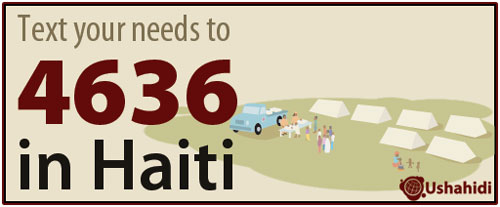Yesterday, with the help of dozens of people from multiple organizations, we launched an SMS short code in Haiti!
If you are in Haiti, report emergency info and location by texting 4636.
Subscribers on the DigiCel network in Haiti can now report incidents by sending text messages free of charge to 4636. The shortcode makes it even faster and easier for eyewitnesses to report developments on the ground.
[caption id="attachment_1178" align="aligncenter" width="500" caption="If you are in Haiti, report emergency information and location by texting free to 4636"] [/caption]
A key goal is to make the SMS project easy to use for those on the grounds with needs and organizations on the ground trying to help. The radical problem is mixing two completely different scenarios here:
[/caption]
A key goal is to make the SMS project easy to use for those on the grounds with needs and organizations on the ground trying to help. The radical problem is mixing two completely different scenarios here:

 [/caption]
A key goal is to make the SMS project easy to use for those on the grounds with needs and organizations on the ground trying to help. The radical problem is mixing two completely different scenarios here:
[/caption]
A key goal is to make the SMS project easy to use for those on the grounds with needs and organizations on the ground trying to help. The radical problem is mixing two completely different scenarios here:
- Finding people
- Relieving needs
How it works
The basic process for this project follows is this:- Put word out that people on the ground can send [Name, location, status/message]
- SMS submitted, with varying levels of structure/detail
- Enters database
- Passed to a mechanical turk-type outfit of volunteers for structuring
- Message is structured in the database
- Gets passed off to orgs (via Sahana) that can do something about the issue
Background
Shortly after we deployed http://haiti.ushahidi.com in the aftermath of the earthquake in Haiti, it became clear we needed a local SMS short code to make mobile reporting more viable. Josh Nesbit, Co-Founder of FrontlineSMS:Medic, took the lead by looking for a contact on the ground in Haiti. Using Twitter, Josh found Jean-Marc Castera who was heading to the DigiCel command center. Josh says that, “skyping with Jean-Marc on the ground, and letting the Ushahidi team in Kenya and the US know I had someone from DigiCel's command center on the line was an awesome moment.” Working in partnership with the U.S. Department of State (Big thanks to @kateatstate), Ushahidi eventually secured the short code 4636 from DigiCel. Meanwhile, behind-the-scenes, Brian Herbert worked with Josh, Luke Beckman from InSTEDD, Paul Goodman from DAI, and Rob Munro to structure content. They created an online database at http://4636.ushahidi.com where incoming raw SMS reports can be tagged and mapped. Local organizations can subscribe to the SMS feed by contacting Brian Herbert. On the ground in Haiti, Nicolas di Tada and Eric Rasmussen, CEO of InSTEDD also provided crucial support. Nicolas did the initial testing of the shortcode and is currently handling local outreach. InSTEDD’s EIS project and Reuters are using the short code to register mobile numbers from people on the ground for vital information blasts. And now we’re looking for volunteers to process the incoming SMS Reports. Please see these instructions to learn how you can help!
Get Involved
The system is currently tracking information in the several categories and subcategories including: emergencies, threats, responder activities, news about individuals, and the location of resources. How to Report:- In Haiti SMS to 4636 or internationally to +447624802524
- Send e-mail to Haiti@ushahidi.com
- Online at http://haiti.ushahidi.com/reports/submit
- Via Twitter with hash tag #haiti or #haitiquake
- Spread the word among friends & family
- Reach out to local organizations and media
- Ask international agencies to share their info
- Send us your comments to feedback@ushahidi.com
- Join us! Visit http://www.ushahidi.com/join for more info